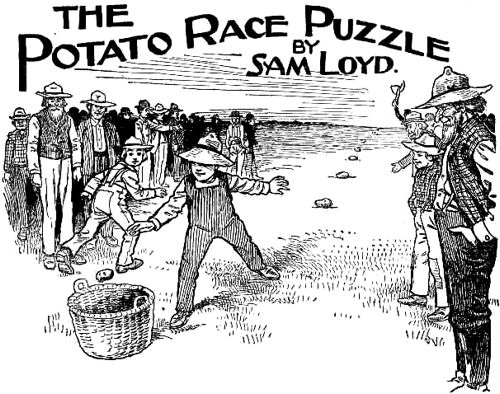



IN THE GOOD OLD days of our daddies no country fair was complete without a potato race, and in some localities the pastime, with certain innovations which make it closely allied to a puzzle, is still popular with the rustic lads and lassies. A hundred potatoes are placed on the ground in a straight line, just ten feet apart, which are to be picked up one at a time and placed in a basket which stands ten feet back from the line. Sometimes when two boys compete, the elder or quicker one is handicapped and has to give his opponent the odds of one or more potatoes. In other words, if Harry and Tom compete in a potato race and Tom gives the odds of one potato, Harry has the right to pick up one potato and drop it in the basket before Tom begins.
It is a sufficiently interesting problem for the average mathematician to figure out how far a person has to travel to pick up the hundred potatoes and bring them in one at a time to the basket. That is one of grand father’s old-time puzzles, with which we are all so familiar that in place of being caught by guessing a distance which is miles too short, the modern puzzlist is apt to give an estimate many miles too long. There is a simple rule for solving problems of this kind, so we will also ask our young students to calculate how far the kid must travel to pick up 100 potatoes placed 10 feet apart and carry them one at a time to the basket placed ten feet back?
The real potato race puzzle, however, which will tax the cleverness of our solvers turns upon the relative speed of two lads and the question of handicapping by giving the odds of one potato.
Now, in the present case the lads are very evenly matched, nevertheless, as it was found that Tom was 2.04 percent, quicker than Harry, it was agreed that he should give him the odds of just one potato! So, in order to win the race, Tom, who moves 2.04 the quickest, must bring in fifty potatoes before Harry can get his forty-nine. The sketch shows Harry dropping in the potato which he has selected out of the 100, which starts the race.
It will be found that the result, of the race varies according to which one of the potatoes Harry elects to receive for his handicap. The second and more difficult proposition, therefore, is for you to tell the exact result of the race if Harry selects the most favorable potato, always remembering that Tom runs 2.04 percent, the faster.
In the Potato Race puzzle, it does not take much time to prove that 101,000 feet, or a little more than 19 miles, must be traveled to gather 100 potatoes placed ten feet apart. Despite of the fact that it looks as if Tom, who was 2.04 percent, quicker and should win in ninety-nine cases out of a hundred, yet Harry will win by the slightest possible margin if he takes the odds of the ninety-ninth potato. Tom being the quicker, will get the first potato, Harry the second, and so on to the last, but Tom never gets the chance to capture two adjacent potatoes.
Harry will have to go 49,980 feet to bring in his 49 potatoes, and as Tom can go 2.04 percent, quicker, he could go just 50,999 and a half feet during the same time, but as he would have to go 51,000 feet to bring in his 50 potatoes. Harry will win by less than half a foot!
2. Deeply Injured.
Her eyes were wild, her hair was in disorder, her face was flushed, her hands were clenched. She was a deeply injured, desperate woman.
“Oh, cruel one, she cried,” in anguished tones. “I have borne with you too long! You have injured the very foundations of my being. Day by day you have tortured me, and yet I could not bear to give you up. When first we met, how your ease and polish attracted me! When you became my own. How many friends envied me! Yet your understanding is too small for my large soul. You are opposed to my advancing myself. You have ruined my standing in society. If we had never met I might have walked in peace. So begone. We part forever!”
There was a moment’s convulsive breathing, a gritting of teeth and a sharp sigh. It was all over. By a supreme effort she had removed her __________?
The lady who was “deeply injured” had removed a tight shoe!
[Page 81]